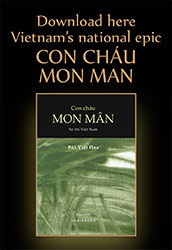
For a long time epics have been seen as falling into one of two categories: oral, sung epics, and literary epics. In comparative epic studies, however, a third category has come into use in recent years: tradition epics. Oral epics still appear in Southeast Asia and Africa, while Vergil’s Aeneid and John Milton’s Paradise Lost are examples of literary epics. The category of tradition epics includes the Sumerian Gilgamesh, the Greek Iliad and Odyssey, the Icelandic Edda, the Indian Mahabharata, and the Finnish and Karelian Kalevala. The new Vietnamese epic, The Descendant of Mon Man, belongs to this third category. It is not a coincidence that it is in the same group as the Kalevala. Bui Viet Hoa, the writer of the Vietnamese epic, has translated the Kalevala into Vietnamese, and during the course of the work she became closely acquainted with the process and methods by which Elias Lönnrot created the Kalevala – now a classic of world literature – over 150 years ago.


A tradition epic can live and evolve in the same way that a bard varies an oral epic with each performance. The writer of a tradition epic can be likened to the bards, who hold an expansive collection of traditional epic subject matter in their memories. The writer has access to an even broader set of material, but he or she handles it in the same creative way that a bard handles traditional material. As such, it is possible that The Descendant of Mon Man may also gain new forms – a version for children is already expected.
Vietnam is one of those rare countries where the folk poetry is ancient, where it is still a living tradition, and where it has been possible to create a tradition epic from the foundation of folk poetry and surviving mythological stories.
